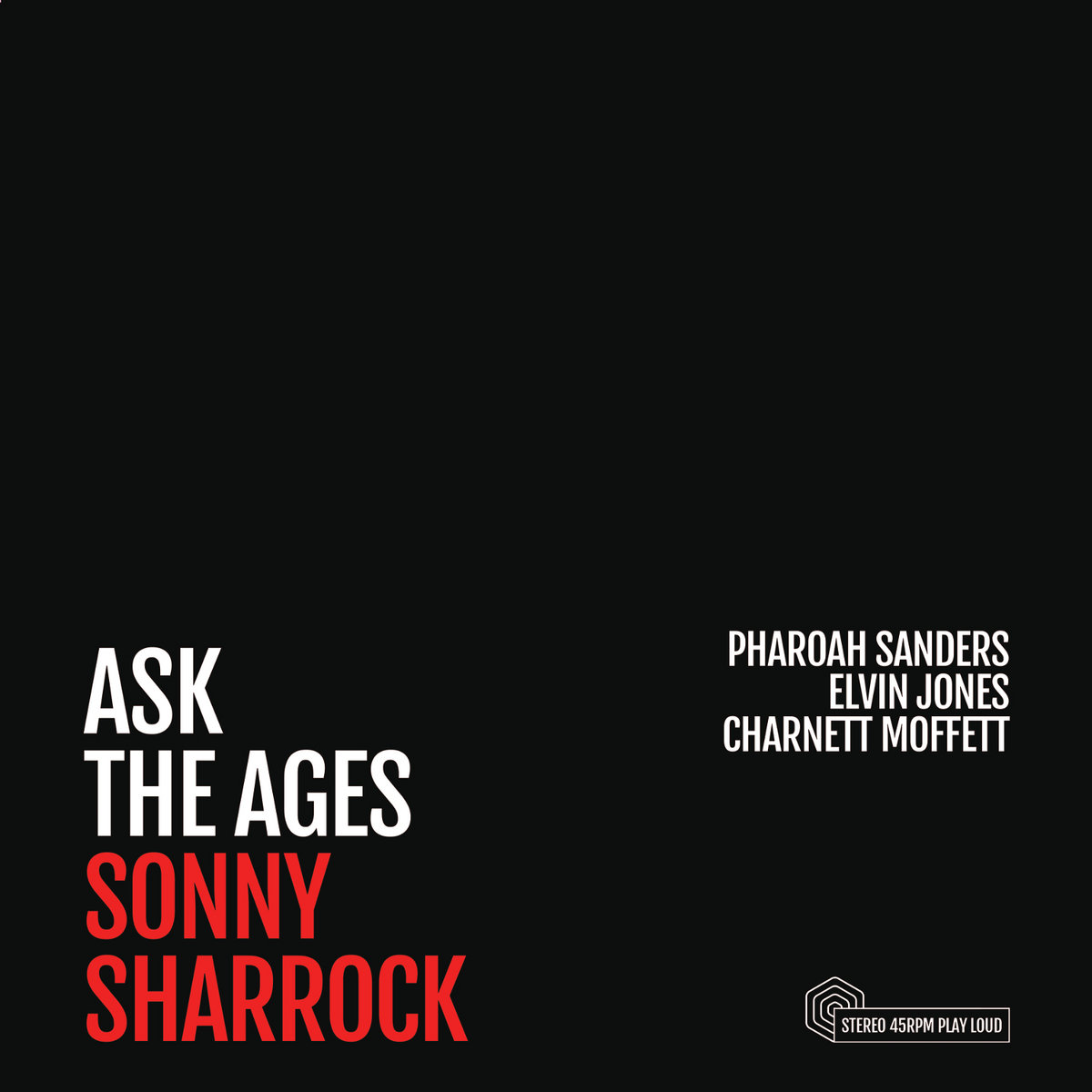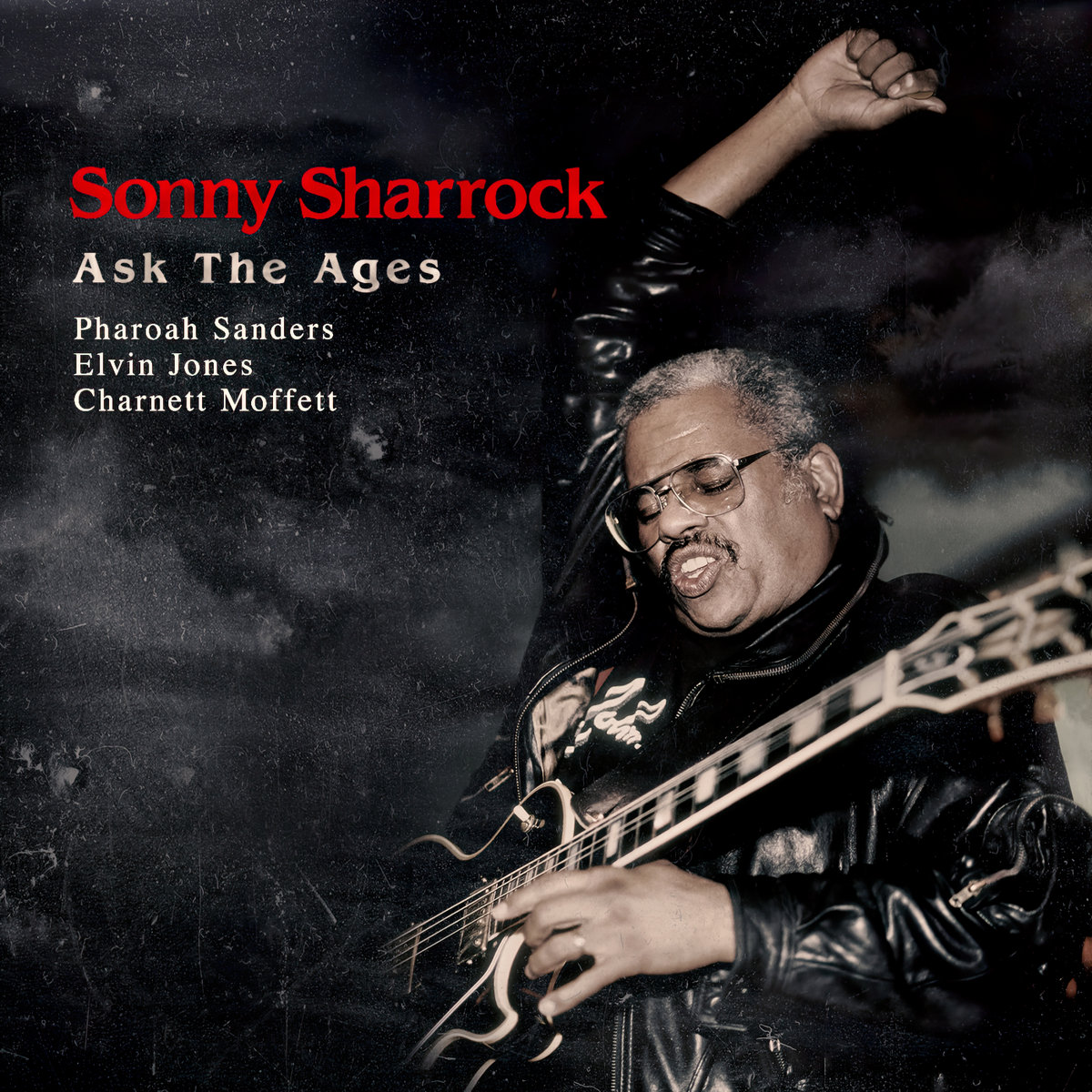SONNY SHARROCK










1/ Promises Kept (Sharrock) 9.43
2/ Who Does She Hope To Be? (Sharrock) 4.41
3/ Little Rock (Sharrock) 7.12
4/ As We Used To Sing (Sharrock) 7.45
5/ Many Mansions (Sharrock) 9.31
6/ Once Upon A Time (Sharrock) 6.26
Recorded at Sorcerer Sound and Greenpoint Studios, New York
Engineers at Sorceror Sound: Jason Corsaro and Oz Fritz
Engineer at Greenpoint: Robert Musso
Mixed by Jason Corsaro at Platinum Island
Assisted by Wes Naprstek
Produced by Bill Laswell and Sonny Sharrock
Production coordination: Nicky Skopelitis
Business Administration: Tony Meilandt/AGM
M.O.D. Technologies: Yoko Yamabes
Support: Dave Brunelle
Mastered at Masterdisk by Howie Weinberg
2015 version remastered by Michael Fossenkemper a Turtle Tone Studios
2019 version remastered at Church Road Studios
2021 version remastered at Sterling Sound
Sonny Sharrock: electric guitar; Pharoah Sanders: tenor & soprano saxophones;
Elvin Jones: drums; Charnett Moffett: acoustic bass.
1991 - Axiom/Island (USA), 422-848 957-2 (CD)
2015 - M.O.D. Technologies (USA), MOD00016 (CD)
2019 - Hive Mind Records (UK), HMRLP005 (2xLP)
2021 - Vinyl Me Please/Island (USA), B0030287-01 (Vinyl)
2022 - Bill Laswell Bandcamp (24 Bit digital)
Note: Bill Laswell does not play on this album.
Scott Yanow (courtesy of the All Music Guide via the Get Music website)
If you think you've heard everything an electric guitar can do but the name Sonny Sharrock doesn't ring any bells, it's time for you to think again. Back in the days before jazz guitarists were cranking their amps up to 11 and before rock guitarists began acquiring jazz-based chops – before Hendrix, before Cream – the R&B-seasoned guitarist Sonny Sharrock was whipping up sonic thunderstorms in the company of Pharoah Sanders and other seminal free-jazz players.
One minute Sharrock would be quietly, rhythmically chording, like the doo-wop vocal-group guitarist he once was. Then, without warning, he'd burst into a paroxysm of six-string mayhem – thumb-picked bass runs rumbling like subways, seething distortion, glass-shattering tone clusters that sounded like someone was ripping the pickups out of the guitar with-out having bothered to unplug it from its overdriven amplifier. In the days when the Yardbirds' "Shapes of Things" seemed to be the cutting edge of electric-guitar music, Sharrock was a true visionary, in a class with nobody but himself.
Sharrock wasn't just "ahead of his time." Like a freight train roaring through a darkened station not just hours but weeks ahead of schedule, Sharrock was here and gone before anybody even knew he was coming. After a memorable series of albums with Pharoah Sanders and other jazzers and some powerful but quickly deleted solo albums on the French Byg label and Atlantic's short-lived Vortex subsidiary, Sharrock seemed to fade from view. Musicians talked about him, keeping his legend alive, but Sharrock himself was back home in upstate New York, playing local gigs and waiting for music to catch up with him.
During the early-Eighties New York No Wave fracas, punk and noise guitarists – ranging from certain Captain Beef-heart axemen to Richard Hell-Lou Reed sideman Robert Quine – began exploring some of the areas Sharrock had mapped out. With bands like the Voidoids, the Contortions and Sonic Youth breaking down boundaries, Sharrock's time drew nearer. When bassist Bill Laswell emerged from that same downtown scene as a producer and bandleader to be reckoned with, one of his first priorities was finding Sonny Sharrock. Laswell and Sharrock first collaborated on records by Material, Laswell's floating stock company of a band. In 1985 a Laswell-produced solo album, Guitar, announced that Sharrock was back and burning. Last Exit – a Laswell-organized electric free-noise band featuring Sharrock – recorded and toured Europe around the same time.
But these events were mere preludes to the one-two punch of Ask the Ages and Faith Moves, which display Sharrock's wild and wily wisdom in all its tumultuous glory. Of course, a player as stubbornly original as Sharrock would never have been content to remain static while the rest of the world caught up with him; his playing has evolved enormously. The bursts of wall-rattling shiver and clang have been augmented by an equally intense concentration on the purest, most liquid guitar tone and by a simple, stirring lyricism.
Ask the Ages ranges from sinuous guitar-and-sax chants to metal-twisting sonic collisions. But while nobody actually sings on Faith Moves, the entire album sings, its six-string overtones chiming harmoniously with the richness and emotional immediacy of a gospel choir. Faith Moves is the ideal introduction to Sonny Sharrock's idiosyncratic style and bedrock soul.
Sharrock's auspicious reemergence ought to have a nation of aspiring guitarists taking another look at their methods and means. Who wants to play faster than Eddie Van Halen or Steve Vai when you can say as much as they say in an entire solo with just one perfectly inflected note? Welcome back, Sonny. It's been a long time, but maybe that doesn't matter; this music is timeless.
4 stars out of 5
(edited for relevance by Silent Watcher)
Robert Palmer (courtesy of the Rolling Stone website)
During the time of year when all the leaves are gone and the nights are long, without flaw, I begin an annual shift into pensive hibernation. Three transformations take place in me that I neglect the rest of the year. First, I rediscover my oven and the delights of baked deserts; I crank out enough cookies, sweet breads, and pies to make your grandma green with envy. This comfort food fattens me up for coming winter months and lays the groundwork for the next metamorphous that takes place. Step two, I become a raging midnight hour film fanatic of the black and white persuasion. Night after night, I sit in the dark, wrapped in a fuzzy down comforter, nestled up with my chubby cat Delilah in a drooling semi-diabetic coma from all the of baked yumminess, and I watch movies from Tinsel Town’s golden era, with an occasional Criterion Collection selection sprinkled in to appease my highbrow aspirations.
The final phase of my march towards monastery-like introspection takes full effect: I dig into that forgotten attic of my record collection, the hidden corner that contains that most cerebral of musical art forms, the music that makes documentarian Ken Burns wet his starched slacks with glee — the music known as jazz. Sure, some of you have your Mannheim Steamroller Christmas collections to sip eggnog to while wearing your holiday-themed sweaters. Not me. I prefer to transport myself to an imaginary Parisian nightclub thick with cigarette smoke, where Billie, Miles, Duke, and the like reign supreme. I suppose I could choose to watch an inspirational and heartwarming made-for-TV holiday movie starring Meredith Baxter Birney on one of those family-friendly cable networks like my mom does, but would Meredith Baxter Birney provide the appropriate acoustical ambiance I require for making a Bundt cake? I think not.
Oh, but don’t think my appreciation for jazz lies only with musicians who grace U.S. postage stamps. This is where I seem to differ from the aforementioned filmmaker with starched slacks. You see, I also get my freak on to avant-garde jazz from the ’60s, where giant afros stare at me from the album covers. I weird-out to those art-damaged beatniks hanging out in the downtown New York lofts during the ’80s. I scan the pages of Wire magazine for the latest improvisations hitting the streets from some unheralded, underground maestro. This is my wintertime, get-out-of-bed-and-face-the-world music. This provides the jolt I need to shake the sugar hangover from the previous night’s confectionery smörgåsbord. This is the fiery yang to my moonlight yin preference of bebop, ballads, and swing. That’s where Ask the Ages by Sonny Sharrock comes in. But really, as fascinating a topic as I am, enough about me.
You might be familiar with Sonny’s guitar sound already. He recorded the theme song for Space Ghost Coast to Coast, is featured on several Ron Burgundy-approved Herbie Mann records, and played with Miles Davis’ early ’70s fusion band. But that only scratches the surface of what Señor Sharrock does when plugged in. Sonny shreds on the guitar. Not the sort of hair guitar shredding that is promised in the tabs of the glossy guitar mags with Joe Satrioni and Stu Hamm on the cover. If I were to make assumptions, I would guess that Sonny could shred after finding the glowing orb from the cartoon cult classic movie Heavy Metal lying in his backyard, which gave him the guitar power of Greyskull. It’s kinda like if the love child from the respective worlds of Rod Serling and Lewis Carroll was given a guitar, these would be the sounds that it produced. Is it making sense for you yet? Sonny Sharrock is the guitar boss you’ve never had. I don’t care how good you are at Guitar Hero, even if you have Thad Jarvis backing you up; there is no way you are producing the whacked-out sounds that come from Sunny’s six string. Too bad for any of you wannabe Yngwie Malmsteen blowhards reading this; I’m not technical enough to be able to tell you what’s going on from a theoretical point of view. (I do, however, have a great recipe for ginger snaps.)
Joining Sunny on Ask the Ages are two undisputed grand poobahs of free jazz, Pharaoh Sanders on saxophone and Elvin Jones on drums. Elvin is best known for propelling John Coltrane through his peak creative years, and Pharaoh has my second favorite name in jazz after former Jazz Messengers bassist Spanky DeBrest. Pharaoh howls and shrieks in all the right ways to compliment Sonny on his exploration of the stratosphere; there are moments when the intensity is at such a fevered pitch that you absolutely think one of them is on the verge of blowing an o-ring.
But this isn’t a total skronkathon that can turn off many listeners to free jazz; there is a lot of variety going on here. On "Who Does She Hope To Be?" for example, the band simmers it down for a scorching electric blues. You know that obnoxious commercial where a bunch of baby boomers are sitting around singing Viva Viagra? I bet they crank out some electric blues while driving in their midlife-crisis convertibles — but Sonny isn’t playing the generic electric blues that would appeal to that crowd. This is the sort of soul searching electric blues that reminds me of Eddie Hazel’s "Maggot Brain" from the Funkadelic clan. If I had to find a flaw in that song, it’d be its brevity, and that it isn’t opened up enough to let Sonny totally rip into the ether as it’s on the verge of doing. Meanwhile, on "Many Mansions," I hear Love Supreme-era Coltrane being channeled. Which reminds me of the time I went to the Church of John Coltrane in San Francisco and had some red beans and rice. Which just triggered my salivary glands and is making me aware of that delicious aroma coming out of my oven. Which is making this review come to an abrupt end. Godspeed, mix tape fans, godspeed.
4.5 out of 5
Shuggypop (courtesy of the Tiny MIX Tapes website)